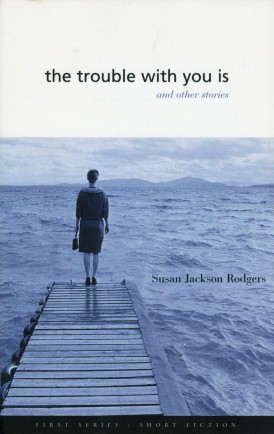The Trouble With You Is

“Susan Rodgers is an extraordinary talent and her debut collection offers some of the very finest stories I have seen in a long while. She goes right to the heart of a story and with expert skill points to the most fragile filaments holding people and places together. Her humor is ever present, often running against the current of sadness and loss, magnifying and mirroring our human frailties.” —Jill McCorkle
“The Trouble with You Is is about women who know you can’t quite stave off death, infidelity, betrayal, envy, lost love, or any bankruptcy of the heart, but understand that meanwhile we need to eat. So they fry eggs, pick green beans, put together a chicken casserole, uncork wine. They’re stoic, but they have to be because they keep taking big chances that might launch them toward love, or, if their judgment’s wrong, its palpable absence. These stories are sweet and cruel at the same time, and beautifully written.”—Debra Monroe, author of A Wild, Cold, State, Newfangled, and Shambles
“Susan Jackson Rodgers’s stories are gracefully written, emotionally honest, often funny and sad in the same moment. Rodgers writes with confidence and compassion about a wide range of characters and situations: in ‘Lost Spirits,’ a twelve-year-old boy attends seances staged by his grandmother and great-aunt, during which he tries to reach his father, who may or may not be dead; in ‘Still Life,’ a sixty-seven-year-old woman tries to mend a troubled relationship with her grown son who is dying of cancer; in ‘Beautiful Things,’ a young wife and mother tries to find a way to live with an abusive husband, even as she quietly plans her eventual escape from him. Rodgers is particularly insightful in stories like the title story and ‘How I Spent My Summer Vacation,’ in which she explores the mistakes women make when they’re too young and innocent to realize the dangerous long-term consequences of impulsive decisions. A wise and memorable book.”—Judith Slater, author of The Baby Can Sing and Other Stories
“Reading these stories, I felt at times like a teenage boy peering into the girls’ locker room and seeing far more than I was prepared to absorb. But there is no looking away. The young, old, and middle-aged women who make up her intimate and honest world are, one and all, fearful and fascinating to behold.”—Pete Hautman, author of Mrs. Million